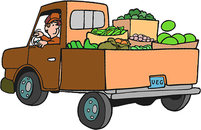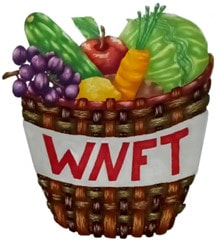 A couple of students have contacted me recently, asking for interviews for class projects. I'm so glad high schools are including awareness of charitable organizations in their curricula! Here are the most recent questions and answers. How long has this organization been around? We started August 1, 2015, as Benefit Brownies. I was a pastry chef and then an office manager and small business consultant. I became disabled in early 2015, and had the first of several surgeries in July that year. Sitting around recovering gave me time to think about what I wanted to do next with my life, now that my physical capacity was diminished, but I had a modest disability income so a salary wasn't mandatory. I've always loved to feed people, and am especially passionate about providing for people whom society has passed over. So I started Benefit Brownies to raise funds to fight hunger. I would use the funds to develop a network of volunteers to "rescue" edible leftover food and get it to people in need. I hoped to commission an app, similar to Uber, that would be open source. Then I could document the whole process and offer it to other communities to start their own programs with no costs. What motivates you to give your time to this cause? Once you've provided something as essential as food to someone who doesn't have enough, you can't ever turn your back on this problem. I'm glad that my humanity and sense of decency make me uncomfortable with our failures as a society, and that they push me to do something about it. I feel very fortunate to be able to choose where, when, and how to serve, and I'm very aware that I have a level of privilege that 90% of the world will never have access to. Most people are struggling so hard just to survive that they can't rise above their own needs to serve any other purpose, let alone choose a satisfying way to do that. And, selfishly, I have to admit that I need something productive to do with my days, a certain amount of structure, a certain accountability to others, that keeps me from becoming isolated and depressed. The more we care about other people, the richer our lives are. I have a very rich life! How does helping so many people make you feel? I used to think I would feel a lot of satisfaction in providing food to poor people, but it's not anything like that. It's humbling. It makes me feel apologetic, that I'm part of a community that allows people to go hungry and homeless, and that all I'm able to do about it is offer some food. In all the years I catered gourmet food to the wealthy, I never met anyone so grateful, kind, generous, and open. The people I meet on the street are amazing, and it's a privilege to be allowed into their lives, to learn their needs and fears and joys. They're all so vulnerable, but they don't let that rule them -- they find pleasure in simple things like a hot meal. They're eager to share with their neighbors, a quality so much richer because they have so little. You can't come home from them and take for granted your access to heat and a comfortable bed and running water. Where is the organization now compared to when it started? It didn't take us long, as Benefit Brownies, to learn that our little fundraising efforts weren't having a big impact. We also learned that the need isn't so much for money as it is for a volunteer force, for community energy, in getting already-available food to where it's needed. By January, 2016, we were focusing on Waste Not Food Taxi. When I suffered another health setback in August that year, we gave up the brownie baking completely, as I was no longer able to do the physical work. I started spending my time, instead, using mostly social media to invite people to volunteer. I phoned all the pantries, shelters, and free meal programs I could find and asked what kinds of food they needed most and when, and then went to area stores and restaurants to invite them to donate leftovers instead of throwing them away. In September, we enlisted 1 grocery store, a bakery, a bagel shop, and a coffee house. By the end of 2016, we were picking up about a ton of food a week, a lot of it from cafeterias in the Beaverton School District. We started partnering with other agencies to share resources, pick up from one another, and do our best to put edible leftovers to the most effective use. Now in the middle of March, 2017, we only pick up less than two tons of food each week when we can't line up big enough vehicles to move it all. We're launching a Saturday free food pantry this Saturday, because Saturdays seem under-served in Washington County. And we're actively seeking funds to add a vehicle to our operation, allowing us to deliver hot meals to people where they are. Whether it's a full-fledged food truck or a small pick up with pots of soup in the back will be determined by the amount we can raise. We hope to be offering mobile free meals by the end of this summer. What interesting things have happened while trying to start this organization? I had a small retirement account when I started this, and had to spend most of it to get off the ground. Just the licenses, permits, and other fees were about $1,000, and I had to rent commercial kitchen time to bake. I was surprised how little money I was able to raise. I expected to need to work hard to make any difference, but have since realized that hard work isn't what I have to offer, and it isn't what is most needed. As I continue to try to bend and adapt as I learn, I find that community organizing and "selling" this idea to volunteers and donating businesses are both my strengths and society's needs. Populating spreadsheets and sharing technology with other agencies is a much bigger part of this work than I expected. I'm glad, since my physical ability is so limited. But I never want to lose my direct connection with people living without shelter. They are my constant reminder of the simple basic needs of mankind and how easy it is to provide and care for one another. I believe that being out of touch with that simplicity is our culture's greatest loss.
1 Comment
|
AuthorSusie Snortum is passionate about improving society's compassion for meeting basic human needs -- food, shelter, clean water, and dignity. Archives
September 2020
Categories |
We appreciate your support!
Hours
|
Telephone
|
Email
|
ADDRESS: 17850 NW Park View Blvd, Portland, OR 97229 United States

 RSS Feed
RSS Feed